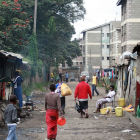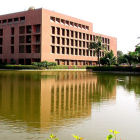By: Yojana Sharma
Send to a friend
The details you provide on this page will not be used to send unsolicited email, and will not be sold to a 3rd party. See privacy policy.
A dispute over the HINARI scheme, which gives poor countries free access to journals, has exposed the sensitive border between aid and commerce, findsYojana Sharma.
When the WHO notified Bangladeshi research institutions in January that several international scientific publishers had withdrawn free access to their medical journals, shock waves spread through academic communities in developing countries.
HINARI , the WHO-administered Health InterNetwork Access to Research Initiative, is a collaboration between the WHO and commercial publishers which grants researchers in poor countries free access to expensive medical literature.
But the sudden withdrawal of some of its flagship publishers from Bangladesh and several other low-income countries raised questions about to what extent HINARI is a development aid scheme and to what extent a commercial project.
Although one of the publishers— Elsevier — has now restored access, some poor countries are beginning to feel they have been given the keys to little more than a castle in the air, built on a non-binding agreement that can be withdrawn with little notice.
But several publishing firms say privately the agreement was always, for them, a combination of corporate social responsibility and a commercial route to new markets. Now, as rich-world markets shrink, publishers are pursuing sales to developing countries more vigorously.
Two tiers
HINARI was launched by WHO and six of the world’s largest publishing companies in 2002. The scheme granted some 68 countries free access to 1,500 journals, and the number has grown: in 2010, 105 countries, in two bands, accessed almost 8,000 journals.
Band One groups low-income countries with a GDP per capita (in 2010) of US$0-1,600. These are supposed to receive free access. Band Two is mid low-income countries with an annual per capita income of $1,600-$4,700: these must pay US$1,000 per year for full access. This revenue goes into training and education in the developing countries.
Under the agreement, HINARI is supposed to notify a country approaching graduation from Band One to Band Two, or one about to leave Band Two. And a country should be over the limit for two years before this notice. However, a publisher may also withdraw from providing free access if commercial opportunities arise in a country.
Some countries that qualify economically, such as China, Egypt, India and Indonesia, were excluded from the start because of their existing commercial potential. Others have been excluded for some time, including Iran, Pakistan, Philippines, South Africa and Thailand.
Sudden exclusion
Tracey Pérez Koehlmoos: is HINARI falling apart?
It was Tracey Pérez Koehlmoos, head of the health and family planning systems programme at the International Centre for Diarrhoeal Disease Research in Bangladesh, who first raised the alarm when her institution, along with 100 others in Bangladesh, was cut off from the scheme.
The move was surprising because Bangladesh falls into Band One and little notice was given.
And in Kenya, librarian Nasra Gathoni, at the Aga Khan University in Nairobi, was given little notice that in 2011 the library would lose full-text access to journals from Elsevier and Springer. Librarians in Tanzania and Nigeria — countries that, like Kenya, are in Band One — say they, too, are affected.
"Lots of countries have been getting these letters (exclusions) every year," says Richard Smith, a former chief executive of the BMJ publishing group, who was instrumental in setting up HINARI.
Gathoni says HINARI’s email read: "One of the conditions of HINARI (is) the publishers have the right to protect their existing business and may choose not to offer their journals to countries where they have significant sales or local sales agents. This is the case for Kenya."
"It was our worst nightmare come true," says Gathoni. "We were offered such good resources and suddenly they were withdrawn.
"HINARI is the best thing that has come our way in terms of access to health-related journals."
Contrite
The outcry has led to a contrite Elsevier swiftly restoring its free access. Elsevier is a major publisher and participant in HINARI. One of its journals, The Lancet, even published an opinion criticising the publishers, by Koehlmoos and Smith, and also an irritated editorial saying "Any country designated as ‘low human development’ by the UN justifies a clear and unambiguous commitment by all publishers to full and free access to research through HINARI."
Koehlmoos and Smith went as far as to suggest that HINARI was falling apart. Publishers may have "hoped, cynically, that they could hook research institutions and subsequently move them to a paying model, as has happened (in Bangladesh)," they wrote.



Kenya: still in the low-income band
Flickrkrosinski
Open access advocate Barbara Kirsop, who represents the UK-based Electronic Publishing Trust for Development, says: "It looks as if the publishers are legitimately ‘grooming’ developing countries and, when their GDP grows, they simply transfer them to commercial contracts."
The episode has highlighted poor transparency over the terms of HINARI, which has existed more as a verbal understanding between the WHO and publishers than an agreement with set criteria, reflecting the need to secure deals and implement them, rather than stumble over details, when HINARI was being put together.
"It would be fair to say that communication between HINARI, the publishers, and the developing country institutions has been poor," wrote Koehlmoos and Smith.
Perhaps most importantly, though, is the non-binding nature of the agreement.
"Publishers can withdraw any time they want, any content they want," says Leslie Chan, director of Bioline International, of Canada, a collaborative open access platform for some 20 developing countries. The HINARI system "is arbitrary to start with and easy to abuse," says Chan, who has attended meetings between publishers and HINARI.
"Publishers don’t want to put down on paper what they are committed to so that they can say they are not violating any commitments."
Commercial case
Needless to say, the publishers see the situation differently.
"We are not ashamed to say that if we can pursue a commercial agreement, even if it is for peanuts, we will pursue that," says Eric Merkel-Sobotta, Springer spokesman in Germany.
He adds that the company is expanding fast in developing countries, with new offices established in South Africa and Brazil: "HINARI is an established programme and well organised. There will always be countries we can’t reach and UN agencies have almost universal reach. It is not often that we get to partner with UN agencies in countries that are poor, together with other publishers. It is a fantastic public-private partnership".
Springer, which provides access to over 500 journals through HINARI, excluded a number of countries in 2006 and 2007, including Bangladesh.
If a commercial deal is done, says Merkel-Sobotta, "in nine out of 10 cases alternatives are available." Many of the larger universities in developing countries participate in several schemes. For example, the International Network for Availability of Scientific Publications (INASP) involves journals that are also available through HINARI. In the Bangladesh case INASP continues to provide access to Springer journals, he says.
But Koehlmoos and Smith’s article says that most Bangladeshi institutions using HINARI do not, in fact, have this alternative.



Aga Khan University: librarian Nasra Gathoni said it was her "worst nightmare come true"
FlickrKash_if
At WHO headquarters in Geneva, Kimberley Parker, HINARI programme manager, has been trying to reduce the potential for damaging recriminations by making exclusion criteria more transparent.
Tinkering with the terms may not be enough, though. Chan thinks the Bangladesh incident is a wake-up call, saying, "if you are building research infrastructure it is absurd to rely on donation. [Developing] countries should be building their own infrastructure — it is not as hard as it used to be. We should be pushing for repositories at the local and national levels."
What are the alternatives?
And publishers do have new revenue sources. The World Bank and development agencies are spending more on higher education and research and this sometimes includes funding for commercial access to journals.
Agencies that want their aid money simultaneously to support their domestic businesses, are open to such schemes. Aid from the German Development Agency has included funds for subscriptions to German publishers like Springer, according to Merkel-Sobotta, so that some institutions move from HINARI to aid-funded schemes.
Some developing countries, including Bangladesh and Kenya, are looking closely at alternatives. These including forming consortia of public universities and institutions that negotiate with publishers to reduce subscription costs.
Some publishers, such as Springer, also favour this model for larger countries, where they negotiate a national site license. But others see this as only a partial solution, as it leaves out organisations or countries that cannot build a large enough consortium to strike a deal.
Safety net
"We have to see if there is a way we can create a safety net for those who are left," says Parker. And there are few alternatives to HINARI.
"The WHO should continue to negotiate with publishers to ensure that we continue to access these priceless resources in Africa," says Gathoni, who is also president of the Association for Health Information and Libraries in Africa (AHILA), which spans 46 countries.
"The last communication we got was reconfirming (HINARI access) till 2015. That is a good assurance for now, but in the meantime we have to start looking beyond HINARI."
David Ruth, head of global communications for Elsevier in the United States, told SciDev.Net that, a few years ago, the company "recommitted to the programme [HINARI] till 2015 based on the assumption that into the future there are always going to be countries not able to afford access, and there is a long-term need for the programme".
The 2015 promise is linked to the Millennium Development Goals timeframe. WHO’s Parker is certain, though, that HINARI will continue beyond that date. Some 400 new journals were added to the system in 2010, mostly from smaller publishers. "HINARI is alive and well," she says, "and responding to a complex, changing world."
Link to full opinion piece in The Lancet (free registration required)













